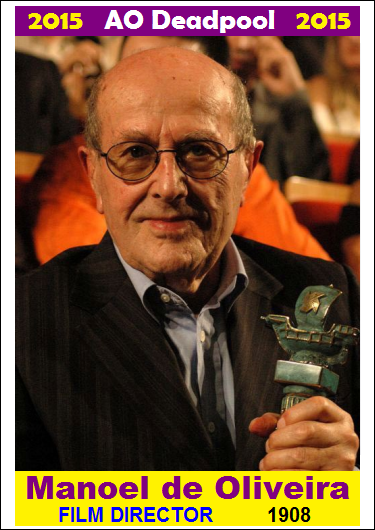Manoel de Oliveira was
mostly a director, sometimes an actor and screenwriter, but he was also a film producer
and a port wine producer. Born as Manoel Cândido Pinto de Oliveira on December
11, 1908, to a wealthy family in Porto, he was one of the last people named
Manoel instead of Manuel, since he was born before the Portuguese spelling
reform. He spent his youth on sporting activities, such as car racing, before
starting a short career as an actor in the 1930s.
Walter Ruttman's film Berlin – Die Sinfonie der Großstadt
inspired de Oliveira to move behind the camera. His first film was a silent
documentary about the river in his hometown, called Douro, faina fluvial (1931). Other films followed. His neorealist
film Aniki Bóbó (1941) was a
financial disaster and caused a break in his working life. He joined his family's
winery and produced port wine.
De Oliveira returned
to cinema at the end of the 1950s, becoming interested in color movies. His
film O Acto da Primavera (1963)
earned him both a gold medal in Siena and a short imprisonment in Portugal. After
that, he made no films until 1971. Between the 1970s and the 1990s, he produced
more than 30 movies, including such stars as John Malkovich, Catherine Deneuve,
Marcello Mastroianni, and Michel Piccoli. Although he didn't produce mainstream
movies, he became a big name in European cinema. His last work, a short film
called Chafariz das Virtudes, was
released in 2014, when he was 105 years old.
His age gave him a final
record. From 2001 until his death, de Oliveira was known as the oldest living
and still active director in the world, and maybe the last one who was active
during the silent-film era. He died on April 2, 2015, in his hometown of Porto,
at the age of 106. After his life as a producer of movies and port wine, he
finally produced 4 points for WEP and Where's My Damn List? (1 for age and 3
for duet).
--WEP
All content
(c) 2005-2015 alt.obituaries Deadpool. All rights reserved.
